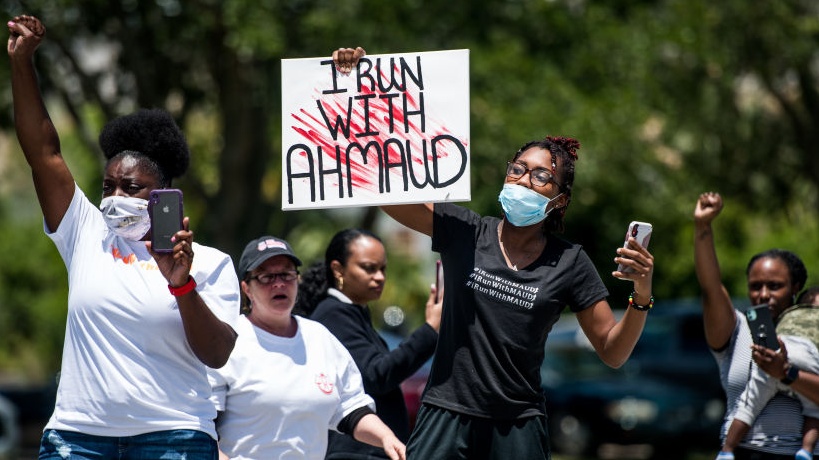The trial for the killers of Ahmaud Arbery, a 25-year-old Black man killed while jogging in Brunswick, Georgia, is currently underway, and the jury selection is complete despite the process being rife with controversy. On Wednesday, 12 people were selected as jurors: one Black person and 11 white members, as well as four alternate jurors.
The jurors will be sworn in on Friday at 9 a.m. before opening arguments by the prosecutors and the defense. The three accused white men, Gregory McMichael, 67, his son Travis McMichael, 35, and a neighbor, William "Roddie" Bryan, 52, face nine counts each, which include malice murder, four counts of felony murder, two counts of aggravated assault, false imprisonment and criminal attempt to commit false imprisonment.
The judge in the #AhmaudArbery trial will not change the jury, despite admitting Arbery's killers' lawyers used "intentional discrimination" to reject Black jurors.
11 of 12 jurors are white.
Arbery's aunt called it "another of the injustices that we see here in Glynn County." pic.twitter.com/63IbDqnqDd
— AJ+ (@ajplus) November 4, 2021
Gregory and his son Travis are accused of chasing Arbery while he was jogging in the Satilla Shores neighborhood of Brunswick. Bryan filmed the encounter from his truck that he allegedly used to hit Arbery, according to ABC News. Both father and son confronted him with firearms. Arbery struggled with Travis and was fatally shot. His killing has many people believing the shooting was racially motivated, although the men claim they thought he was a robber in the neighborhood.
Based on the racial overtones of the case, the prosecutors are not pleased with the composition of the jury. They requested that Judge Timothy Walmsley reappoint eight potential Black jurors and argued the defense lawyers struck them from the final jury due to their race. Based on a U.S. Supreme Court ruling, it is considered unconstitutional for attorneys to eliminate a potential juror based on race or ethnicity.
On Wednesday, Judge Walmsley concurred with the prosecution's suspicions, saying, "This court has found that there appears to be intentional discrimination." Yet, the judge decided to proceed with the trial without considering changing the jury's racial makeup. Walmsley denied the state's motion, claiming he was not able to take action because the defense adequately proved their reasons for their decision to strike potential Black jurors from the panel.
"One of the challenges that I think counsel recognized in this case is the racial overtones in the case. … This is sort of the continuation of a conversation that I think will continue for a long time, with respect to this case," Walmsley said, according to CNN.
A total of 600 people were summoned for jury duty on Oct. 18, according to USA Today. Through a process of elimination, 65 individuals were eligible, and 16 were selected out of that group — 12 women and four men. Through the jury selection process, many would-be jurors expressed they held "negative feelings" toward the three defendants, knew the facts of the case, read the documents online and viewed the video that captured Arbery's alleged killers.
Other jurors had made their decision that the men were guilty. Brunswick is a small coastal town with a predominantly Black population, situated in majority white Glynn County.
The trial is expected to continue through the week of Nov. 19.

